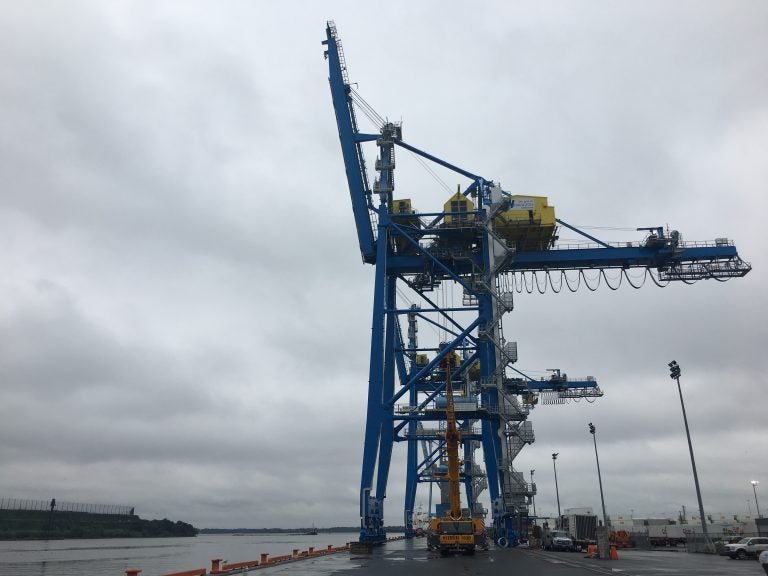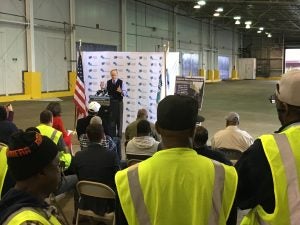Federal dredging measure will help expansion efforts at Port of Wilmington
The quicker dredging process will accelerate Gulftainer's development of a secondary port at the former DuPont Edgemoor site north of the existing port.

New legislation will make it easier for the Army Corps of Engineers to dredge the Delaware River. (Mark Eichmann/WHYY)
A wide-ranging water infrastructure bill, approved this week in the U.S. Senate, will support the effort to deepen the Delaware River and the shipping channel at the Port of Wilmington. The port, which was handed over to United Arab Emirates-based Gulftainer in a 50-year lease deal last month, will be expanded.
The legislation increases the height limit for dredge spoils from 10 feet to 35 feet, which should dramatically increase the speed of the excavation process. The process of placing dredging material is typically slowed while the stacked dirt settles to a lower height so more can be added.
“We’re three and a half times higher in each spot, which gives us more opportunity to move more dredging faster, which then is going to open up the channel quicker,” said Eric Casey, CEO of Gulftainer USA Port of Wilmington.
The quicker dredging process will accelerate Gulftainer’s development of a secondary port at the former DuPont Edgemoor site north of the existing port.
“The building in Edgemoor is really important because that is a brand new terminal that is going to give thousands of jobs,” Casey said.

U.S. Sen. Tom Carper, who visited the port Monday to talk with workers, said the measure will help the Army Corps of Engineers do their job of dredging the river. “We’re bringing some changes in the way they do their work, so it’s fast-tracked,” Carper said.
That speed is good news for Kimoko Harris, business agent for the International Longshoremen’s Association Local 1883. “A few years makes a lot of difference when you have a depressed community, when you have an unemployment rate — particularly in the minority community — hit probably around 40 percent.”
The port has always been an opportunity for young people in Wilmington who may have dropped out of high school or have a criminal background that keeps them from getting other jobs, Harris said.
“Making it fast-tracked means that we can get Edgemoor done faster than was previously thought, and we can put people to work.”
The bill is also a rare example of near unanimity in Washington. “It’s not every day in the Congress that legislation passes the House of Representatives unanimously, this bill did,” Carper said. The bill was approved by a 99-1 vote in the Senate.
Once the measure is signed by President Donald Trump, Gulftainer will meet with the Army Corps to determine the earliest start date for the dredging to begin.
As part of the deal for Gulftainer to take over the port, the company will pay the state an annual royalty, starting at $6 million this year. The payment, which is dependent on the volume of cargo the port handles, is expected to increase to $13 million per year by 2027.
The company will spend $410 million to construct a new container port facility at Edgemoor. It will devote another $170 million to upgrading the existing facility. Company officials suggest the upgrades could generate more than 6,000 direct and indirect jobs while generating $1.2 billion in economic activity for the state.
WHYY is your source for fact-based, in-depth journalism and information. As a nonprofit organization, we rely on financial support from readers like you. Please give today.





